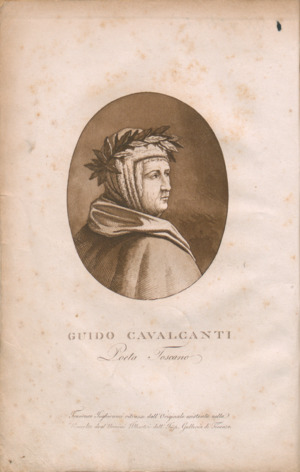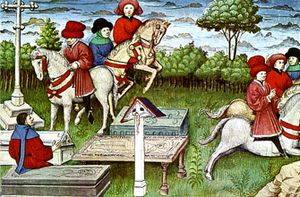Guido Cavalcanti facts for kids
Guido Cavalcanti (born between 1250 and 1259 – died August 1300) was an Italian poet. He was also a close friend and a big influence on the famous poet Dante Alighieri.
Contents
Florence's History and Guido's Time
Guido Cavalcanti was born in Florence when it was becoming one of the most important cities of the Renaissance. This was a time of great change in Europe. People started to explore new ideas in art, learning, and how society worked. Old ways of thinking, often based on religion, began to change. People also started to study ancient Greek and Roman writings again. This led to new ways of thinking about humans and their place in the world, called humanism. Guido lived during this exciting time and helped shape it with his new ideas and poems.
Florence's Politics and Guido's Life
Guido was the son of Cavalcante de' Cavalcanti. His family was part of the Guelph group. Florence was often divided by two main political groups: the Guelphs and the Ghibellines. The Guelphs supported the Pope, while the Ghibellines supported the Holy Roman Emperor. These groups often fought for power in Italian cities.
In Florence, the Guelphs usually included merchants and city dwellers. The Ghibellines were often noblemen. Guido's father was a Guelph. Dante, in his famous poem Inferno, placed Guido's father in a part of Hell. People at the time said that Guido himself often thought deeply about big questions, even about God.
Around 1267, Guido married Beatrice, whose father was a leader of the Ghibelline group. This marriage was not about love, but a way to try and make peace between the families. However, the family feuds continued.
By 1293, middle-class merchants took control in Florence. Nobles were not allowed to hold public office for a while. Guido, from a noble family, refused to become a merchant.
Later, the Guelphs themselves split into two groups: the Black Guelphs and the White Guelphs. The Blacks supported the Pope, and the Whites were against the Pope's influence. Guido joined the White Guelphs. He was a rival of another powerful man, Corso Donati.
In June 1300, the people of Florence were tired of all the fighting. A group of judges, including Dante Alighieri, decided to send the leaders of both groups away from Florence. Guido Cavalcanti was one of them. He was sent to Sarzana. After only a few months, he tried to return home. Sadly, Guido died of a fever, probably malaria, in August of the same year, while on his journey back to Florence.
The Sweet New Style of Poetry
Guido Cavalcanti was an important part of a new style of poetry in Tuscany called the Dolce stil novo. This means "Sweet New Style." Poets who wrote in this style were called stilnovisti.
This new style was influenced by two main types of poetry:
- Troubadour poetry: This came from southern France. It started the idea of courtly love, where a knight would admire a noble lady.
- Sicilian School poetry: This was a group of poets in Sicily who also wrote about courtly love.
The stilnovisti poets, including Guido Cavalcanti and Dante, made this poetry their own. They made it unique in several ways:
- It was city poetry, not just for royal courts.
- It explored the deep thoughts and feelings about love.
- It used the Tuscan language, which became the basis for modern Italian language.
- They used poetic forms like the sonnet and canzone to express their ideas.
Guido Cavalcanti was a key part of these changes in poetry.
Guido's Early Poems
In his early poems, Guido changed the idea of courtly love. He connected love to human intelligence and goodness. He wrote about nature's beauty, but then said his lady's beauty and kind heart were even greater.
|
Biltà di donna, e di saccente core |
Beauty of women and wise hearts |
This poem shows the beauty of the "Sweet New Style" and Guido's clear, powerful way of writing.
One of his important early poems is canzone Io non pensava che lo cor giammai. In this poem, he shares his philosophical thoughts about love.
|
Io non pensava che lo cor giammai |
I never used to think that my heart |
Guido believed that humans had different parts: a part like plants (vegetative), a part like animals (sensitive, for feelings), and a part for thinking (intellectual). He thought that true balance between feelings and intellect was hard to reach. This is why he wrote about "tormented laments" and feeling no peace.
Guido's Later Poetry
Guido Cavalcanti is best known for being part of the Dolce Stil Novo group. He helped develop the "volgare illustre," a higher standard of the Italian language that is still used today.
Other important poets of this style included Guido Guinizelli and Dante. Dante himself wrote that Guido was one of the few Tuscans who truly understood the excellence of their language.
Scholars say that while Dante often wrote about love in a spiritual way, Guido Cavalcanti saw love as a source of pain and sadness. He felt that giving oneself completely to love could lead to torment.
One of Guido's most famous poems is a sonnet called Voi che per gli occhi mi passaste il core (meaning You, Whose Look Pierced through My Heart). He wrote this for his beloved lady, Vanna.
|
Voi che per gli occhi mi passaste 'l core |
You whose look pierced through my heart, |
This poem shows how love, for Guido, could be a powerful force that causes deep emotional pain.
His Masterpiece: "Donna me prega"
Guido's most important poem is the philosophical canzone called Donna me prega (meaning "A lady asks me"). This poem is like a detailed study of his ideas about love. In it, he explains his beliefs and how he changed the ideas of courtly love from the troubadours and the Sicilian School.
In this poem, Guido explores many questions about love, such as:
- Where love is found in the human body.
- What causes love.
- What love's powers are.
- What love is made of.
- How love changes people's bodies and minds.
- What makes us call it love.
- If we can understand love's effects by seeing.
Guido believed that when a man and woman's eyes met, it could start a strong passion. This passion could grow so much that it might lead to great sadness or even feel like death. While these ideas are different from modern psychology, they were part of the medical and philosophical beliefs of his time. Guido's poetry was revolutionary because it described these inner feelings in a very personal and detailed way.
Mentions in Dante's Divine Comedy
Guido Cavalcanti is mentioned twice in Dante's famous poem, Divine Comedy.
- In Inferno (Hell), Dante meets Guido's father, Cavalcante de’ Cavalcanti. Guido's father asks Dante about his son. Dante speaks of Guido in a way that makes the father think Guido is dead.
- In Purgatory, another character, Oderisi da Gubbio, talks about how fame doesn't last forever. He mentions that the fame of one poet, Guido Guinizelli, was soon replaced by Guido Cavalcanti's fame. Through this, Dante suggests that his own fame as a poet will eventually surpass Guido's.
Guido's Lasting Impact
Guido Cavalcanti is seen as one of the first major poets of Italian literature. Dante looked up to Guido as his teacher, and Guido's style and language greatly influenced Dante's own work.
Guido's interesting personality and ideas also caught the attention of Giovanni Boccaccio. Boccaccio included Guido as a famous character in his book Decameron. This helped spread the idea that Guido questioned traditional beliefs.
Later, during the Renaissance, scholars like Pico della Mirandola studied Guido's work. Guido's poetic style helped shape the "volgare illustre," which became the basis for the modern Italian language.
Guido also influenced many English poets in the 1800s and 1900s. Poets like Dante Gabriel Rossetti, Ezra Pound, and T. S. Eliot were inspired by his work. Ezra Pound even translated many of Guido's poems and wrote an opera about him. T. S. Eliot used a line from one of Guido's poems to start his own famous poem, Ash Wednesday.
See also
 In Spanish: Guido Cavalcanti para niños
In Spanish: Guido Cavalcanti para niños
 | Bessie Coleman |
 | Spann Watson |
 | Jill E. Brown |
 | Sherman W. White |



